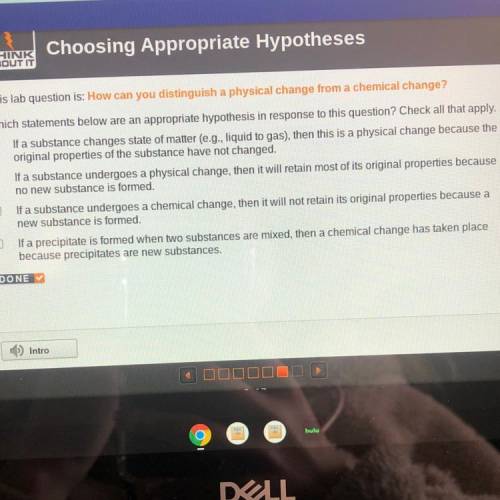
This lab question is: How can you distinguish a physical change from a chemical change?
Which statements below are an appropriate hypothesis in response to this question? Check all that apply.
If a substance changes state of matter (e. g., liquid to gas), then this is a physical change because the
original properties of the substance have not changed.
If a substance undergoes a physical change, then it will retain most of its original properties because
no new substance is formed.
If a substance undergoes a chemical change, then it will not retain its original properties because a
new substance is formed.
If a precipitate is formed when two substances are mixed, then a chemical change has taken place
because precipitates are new substances.


Answers: 2
Other questions on the subject: Chemistry

Chemistry, 21.06.2019 19:30, maddietomlinson113
If the element whose electric configuration ends in the d sublevel, the element is calssified as? a. inner transition b. noble gases c. representative d. transition
Answers: 2


Chemistry, 21.06.2019 23:00, fespinoza019
A100-watt light bulb radiates energy at a rate of 100 j/s. (the watt, a unit of power or energy over time, is defined as 1 j/s.) if all of the light emitted has a wavelength of 525 nm , how many photons are emitted per second?
Answers: 1

Chemistry, 22.06.2019 13:30, amandajbrewerdavis
Table sugar completely dissolved in water is an example of a?
Answers: 1
Do you know the correct answer?
This lab question is: How can you distinguish a physical change from a chemical change?
Which state...
Questions in other subjects:


Mathematics, 18.11.2020 20:10


Arts, 18.11.2020 20:10

Mathematics, 18.11.2020 20:10




Mathematics, 18.11.2020 20:10







